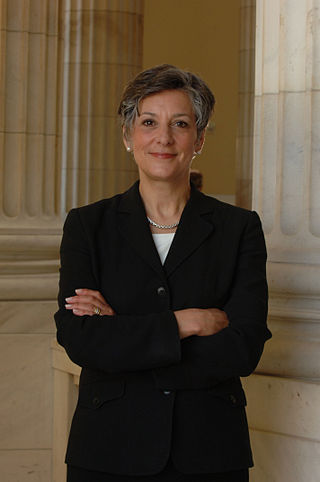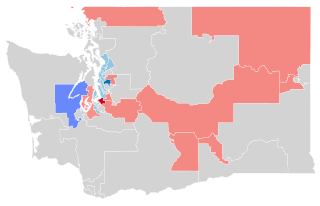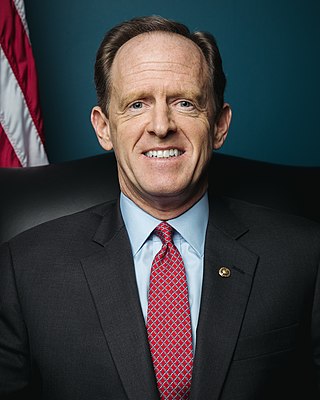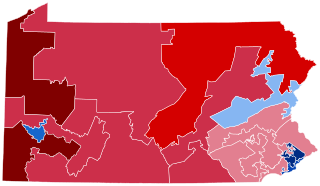
The 1982 United States Senate elections were held on November 2, 1982. They were elections for the United States Senate following Republican gains in 1980. The 33 Senate seats of Class 1 were up for election in 1982. A total of four seats changed hands between parties, with Democrats winning seats in New Jersey and New Mexico, and Republicans taking seats in Nevada and the seat of the lone independent, Senator Harry Byrd Jr., in Virginia. Democrats made a net gain of one seat bringing them to 46 seats, while Republicans stayed at 54 seats for a majority. However, the Democratic gain in New Jersey replaced a Republican that had been appointed earlier in the year.

The 1974 United States Senate elections were held on November 4, with the 34 seats of Class 3 contested in regular elections. They occurred in the wake of the Watergate scandal, Richard M. Nixon's resignation from the presidency, and Gerald Ford's subsequent pardon of Nixon. Economic issues, specifically inflation and stagnation, were also a factor that contributed to Republican losses. As an immediate result of the November 1974 elections, Democrats made a net gain of three seats from the Republicans, as they defeated Republican incumbents in Colorado and Kentucky and picked up open seats in Florida and Vermont, while Republicans won the open seat in Nevada. Following the elections, at the beginning of the 94th U.S. Congress, the Democratic caucus controlled 60 seats, and the Republican caucus controlled 38 seats.

Allyson Schwartz is an American Democratic Party politician who represented parts of Montgomery County and Northeast Philadelphia in the United States House of Representatives from 2005 to 2015 and Northeast and Northwest Philadelphia in the Pennsylvania Senate from 1991 to 2005. She has finished second in a statewide Democratic Party primary twice: for United States Senate in 2000 and for Governor in 2014.
The Pennsylvania Republican Party (PAGOP) is the affiliate of the Republican Party in the state of Pennsylvania. It is headquartered in Harrisburg.
The Pennsylvania Democratic Party is the affiliate of the Democratic Party in the U.S. state of Pennsylvania. It is headquartered in Harrisburg and is the largest political party in the state. Its chair is Senator Sharif Street.

Pennsylvania has been considered a swing state throughout its entire history as it only voted for the nationwide loser on only 10 occasions. Meaning it has voted for the national winner 83% of the time, as of 2020. Although, it generally supported Republicans between the Civil War and New Deal eras, as it voted Republican in every election between 1860 and 1932, except for 1912, when the Republican vote was split. Even then, the state's strong Republican ties meant that it backed Republican-turned-Progressive Theodore Roosevelt. The state backed a Democrat in 1936 for the first time since 1856. Pennsylvania generally leaned Democratic since the 1990s, as it backed the Democratic presidential candidate in every election since 1992 except in 2016, when it was won by Republican candidate Donald Trump with a plurality.

Pennsylvania's state elections were held on November 4, 2008. Necessary primary elections were held on April 22.

The 2010 United States elections were held on Tuesday, November 2, 2010, in the middle of Democratic President Barack Obama's first term. Republicans ended unified Democratic control of Congress and the presidency by winning a majority in the House of Representatives and gained seats in the Senate despite Democrats holding Senate control.

The 1980 United States Senate election in Pennsylvania was held on November 4, 1980. Incumbent Republican U.S. Senator Richard Schweiker decided to retire, instead of seeking a third term.

The 2012 United States Senate election in Pennsylvania was held on November 6, 2012, alongside a presidential election, other elections to the United States Senate in other states, as well as elections to the United States House of Representatives and various state and local elections. Incumbent Democratic U.S. Senator Bob Casey, Jr. ran for and won re-election to a second term, defeating Republican nominee Tom Smith, and Libertarian nominee Rayburn Smith.

The 2014 Pennsylvania gubernatorial election was held on November 4, 2014, to elect the governor and lieutenant governor of Pennsylvania, concurrently with elections to the United States Senate in other states and elections to the United States House of Representatives and various state and local elections.

The 2014 Washington State Senate elections is one of the biennial legislative elections in Washington took place on November 4, 2014. In this election, about half of the 49 legislative districts in Washington chose a state senator for a four-year term to the Washington State Senate. The other half of state senators were chosen in the next biennial election, so that about half of the senators are elected at a time: one group in presidential election years and the other in other even-numbered election years. All the members of the Washington State House of Representatives are elected concurrently with half of the senators every two years.

The 2018 United States Senate elections were held on November 6, 2018. Among the 100 seats, the 33 of Class 1 were contested in regular elections while 2 others were contested in special elections due to Senate vacancies in Minnesota and Mississippi. The winners were elected to 6-year terms running from January 3, 2019, to January 3, 2025. Senate Democrats had 26 seats up for election, while Senate Republicans had 9 seats up for election.

The 2016 United States elections were held on Tuesday, November 8, 2016. Republican nominee Donald Trump defeated Democratic former Secretary of State Hillary Clinton in the presidential election, while Republicans retained control of Congress. This marked the first and most recent time Republicans won or held unified control of the presidency and Congress since 2004.

The 2016 United States Senate election in Pennsylvania took place on November 8, 2016, to elect a member of the United States Senate to represent the Commonwealth of Pennsylvania, concurrently with the 2016 U.S. presidential election, as well as other elections to the United States Senate in numerous other states and elections to the United States House of Representatives and various state and local elections. The primaries were held on April 26. Incumbent Republican U.S. Senator Pat Toomey was reelected to a second term in a close race, defeating Democratic nominee Katie McGinty and Libertarian Party nominee Edward Clifford. With a margin of 1.43%, this election was the second-closest race of the 2016 Senate election cycle, behind only the election in New Hampshire.

The 2016 United States House of Representatives elections in Pennsylvania were held on November 8, 2016, to elect the 18 U.S. representatives from the Commonwealth of Pennsylvania, one from each of the state's 18 congressional districts. The elections coincided with the 2016 U.S. presidential election, as well as other elections to the House of Representatives, elections to the United States Senate and various state and local elections. The primaries were held on April 26.

The 2018 Pennsylvania gubernatorial election took place on November 6, 2018, to elect the Governor and Lieutenant Governor of Pennsylvania, concurrently with the election of Pennsylvania's Class I U.S. Senate seat, as well as elections to the United States House of Representatives and various local elections. Incumbent Governor Tom Wolf won re-election to a second term by a double-digit margin, defeating Republican challenger Scott Wagner and two third-party candidates from the Green Party, Paul Glover and Libertarian Party, Ken Krawchuk. The primary elections were held on May 15. This was the only Democratic-held governorship up for election in 2018 in a state Donald Trump won in the 2016 presidential election.

The 2018 United States House of Representatives elections were held on November 6, 2018, as part of the 2018 midterm elections during President Donald Trump's term, with early voting taking place in some states in the weeks preceding that date. Voters chose representatives from all 435 congressional districts across each of the 50 U.S. states to serve in the 116th United States Congress. Non-voting delegates from the District of Columbia and four of the five inhabited U.S. territories were also elected. On Election Day, Republicans had held a House majority since January 2011.

The 2018 elections for the Pennsylvania State Senate were held on November 6, 2018, with 25 of 50 districts being contested. Primary elections were held on May 15, 2018. The term of office for those elected in 2018 began when the Senate convened in January 2019. Pennsylvania State Senators are elected for four-year terms, with half of the seats up for election every two years.

The 2018 Pennsylvania state elections took place on November 6, 2018. On that date, the Commonwealth of Pennsylvania held elections for the following offices: Governor and Lieutenant Governor, U.S. Senate, U.S. House of Representatives, Pennsylvania State Senate, Pennsylvania House of Representatives, and various others. Primary elections took place on May 15, 2018.





















